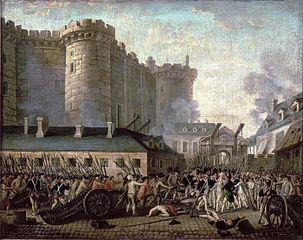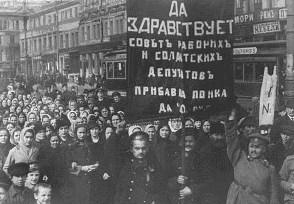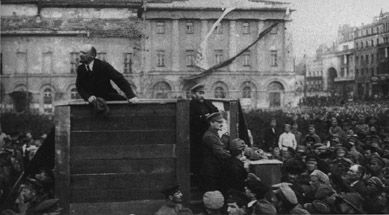THE FRENCH REVOLUTION
What was the French Revolution?
The French Revolution was a period of time in France when the people overthrew the monarchy and took control of the government.

The Storming of the Bastille
The Beginning of the French Revolution
UPDATE-RIYA
When did it take place?
The French Revolution lasted 10 years from 1789 to 1799. It began on July 14, 1789 when revolutionaries stormed a prison called the Bastille. The revolution came to an end 1799 when a general named Napoleon overthrew the revolutionary government and established the French Consulate (with Napoleon as leader).
The French Estates
Before the French Revolution, the people of France were divided into social groups called "Estates." The First Estate included the clergy (church leaders), the Second Estate included the nobles, and the Third Estate included the commoners. Most of the people were members of the Third Estate. The Third Estate paid most of the taxes, while the nobility lived lives of luxury and got all the high-ranking jobs.
Revolutionary Government
The French Government was in constant turmoil throughout the revolution. At the start of the revolution, representatives from the Third Estate established the National Assembly where they demanded that King Louis XVI give them certain rights. This group soon took control of the country. They changed names over time to the Legislative Assembly and, later, to the National Convention. After the Reign of Terror, a new government was formed called the Directory. The Directory ruled until Napoleon took control.
Reign of Terror
The darkest period of the French Revolution is called the Reign of Terror which lasted from 1793 to 1794. During this time, a man named Robespierre led the National Convention and the Committee of Public Safety. He wanted to stamp out any opposition to the revolution, so he called for a rule of "Terror." Laws were passed that said anyone suspected of treason could be arrested and executed by guillotine. Thousands of people were executed including Queen Marie Antoinette and many of Robespierre's political rivals.
Political Clubs
Many of the new political ideas and alliances of the French Revolution were formed in political clubs. These clubs included the powerful Jacobin Club (led by Robespierre), the Cordeliers, the Feuillants Club, and the Pantheon Club.
Outcome
The French Revolution completely changed the social and political structure of France. It put an end to the French monarchy, feudalism, and took political power from the Catholic church. It brought new ideas to Europe including liberty and freedom for the commoner as well as the abolishment of slavery and the rights of women. Although the revolution ended with the rise of Napoleon, the ideas and reforms did not die. These new ideas continued to influence Europe and helped to shape many of Europe's modern-day governments.
Revolution
The French Revolution was a period of time in France when the people overthrew the monarchy and took control of the government.

The Storming of the Bastille
The Beginning of the French Revolution
UPDATE-RIYA
The French Revolution lasted 10 years from 1789 to 1799. It began on July 14, 1789 when revolutionaries stormed a prison called the Bastille. The revolution came to an end 1799 when a general named Napoleon overthrew the revolutionary government and established the French Consulate (with Napoleon as leader).
Before the French Revolution, the people of France were divided into social groups called "Estates." The First Estate included the clergy (church leaders), the Second Estate included the nobles, and the Third Estate included the commoners. Most of the people were members of the Third Estate. The Third Estate paid most of the taxes, while the nobility lived lives of luxury and got all the high-ranking jobs.
Revolutionary Government
The French Government was in constant turmoil throughout the revolution. At the start of the revolution, representatives from the Third Estate established the National Assembly where they demanded that King Louis XVI give them certain rights. This group soon took control of the country. They changed names over time to the Legislative Assembly and, later, to the National Convention. After the Reign of Terror, a new government was formed called the Directory. The Directory ruled until Napoleon took control.
Reign of Terror
The darkest period of the French Revolution is called the Reign of Terror which lasted from 1793 to 1794. During this time, a man named Robespierre led the National Convention and the Committee of Public Safety. He wanted to stamp out any opposition to the revolution, so he called for a rule of "Terror." Laws were passed that said anyone suspected of treason could be arrested and executed by guillotine. Thousands of people were executed including Queen Marie Antoinette and many of Robespierre's political rivals.
Political Clubs
Many of the new political ideas and alliances of the French Revolution were formed in political clubs. These clubs included the powerful Jacobin Club (led by Robespierre), the Cordeliers, the Feuillants Club, and the Pantheon Club.
Outcome
The French Revolution completely changed the social and political structure of France. It put an end to the French monarchy, feudalism, and took political power from the Catholic church. It brought new ideas to Europe including liberty and freedom for the commoner as well as the abolishment of slavery and the rights of women. Although the revolution ended with the rise of Napoleon, the ideas and reforms did not die. These new ideas continued to influence Europe and helped to shape many of Europe's modern-day governments.
Revolution
AN IMPORTANT CHANGE IN ANY FIELD WHICH LEAD TO DEVELOPMENT IS KNOWN AS REVOLUTION.
Political cause
Political cause
-IN 1774 LOUIS 16 ASCENDED THE THRONE OF FRANCE . HE WAS VERY CRUEL RULER. HE BELONGS TO BOURBON DYNASTY.HE FOUND THAT HIS TREASURY OF KINGDOM WAS EMPTY .THE FRENCH MONARCH HAD BECOME COMPLETELY IMMORAL ,UNCONTROLLABLE AND CORRUPT.THERE WAS A COUNTRY WIDE DISCONTENTMENT DUE TO EVIL DEEDS.EVERY PEOPLE IN HIS KINGDOM HAD TO FOLLOW KING ADVICE.HE REQUIRED A LOT OF MONEY FOR THE FOLLOWING PURPOSE :-
MAINTENANCE OF EMPIRE.
MAINTAINING SOLDIER.
MAINTENANCE OF BUFFER STOCK e.t.c
FOR THIS HE REQUIRED A LOT OF MONEY
LOUIS WAS UNDER THE DEBT OF 2 BILLION LIVRES( FRENCH CURRENCY)
FRANCE HELP AMERICA UNDER THEIR COMMON ENEMY (ENGLAND)FOR FREEDOM BY TAKING LOANS .
HE TOOK A LOAN OF 1 BILLION LIVRES BUT OTHER COUNTRY STARTED TO CHARGE 10% INTERST ON THAT AMOUNT.
TO PAY THAT AMOUNT HE INCREASED TAXES
NEW TAXES WERE ADDED
HE DIVIDED THE KINGDOM INTO THREE ESTATES.
SOCIAL REASON
3 ESTATES
CLERGY-THEY HAVE BIRTH PRIVILEGE ,THEY DID NOT HAVE TO PAY TAXES
CLERGY ARE THE GROUP OF PRIEST IN CHURCHES.
NOBILITY- THEY WERE ALSO FREE FROM TAXES.MAINLY THE FAMILY MEMBERS AND RELATIVES OF KING COME UNDER THIS CATEGORY.
COMMON PEOPLE-THEY HAVE TO PAY ALL TAXES.DUE TO ADVERSE CONDITION ,CROP GET DESTROY .HENCE ,PRICE OF CROP INCREASES.COMMON PEOPLE WERE UNABLE TO BUY CROP ,
TITHES -TAXES TOOK BY CHURCHES
TAILLE-TAX DIRECTLY ACCEPTED BY RULER.
ECONOMICAL REASON-
TREASURY OF KINGDOM WAS EMPTY TO ADMINISTRATE THE KINGDOM.PEOPLE BECOME ANGER.ALL THIS LEAD TO REVOLUTION.
TREASURY OF KINGDOM WAS EMPTY TO ADMINISTRATE THE KINGDOM.PEOPLE BECOME ANGER.ALL THIS LEAD TO REVOLUTION.
EFFORT OF WRITER AND POET:
THEY INFLUENCE COMMON PEOPLE FOR CHANGING THE DISCRIMINATED SYSTEM.
1 MONTESQUIEU- HE WAS A WRITER. HE WROTE A BOOK"THE SPIRIT OF THE LAW"
IN WHICH HE PUT FORWARD THE IDEA THAT THE POWER OF THE GOVT. MUST BE DIVIDED IN 3 PARTS
LEGISLATIVE ,EXECUTIVE AND JUDICIARY..
2 JOHN LOCKE- HE WROTE THE BOOK "TWO TREATISE OF GOVT."HE APPEAL TO PEOPLE THAT DIVINE AND ABSOLUTE RIGHT OF MONARCH SHOULD BE ENDED.
3 JEAN JACQUERS ROUSSEAU-HE WROTE THE BOOK SOCIAL CONTRACT.HE APPEAL TO PEOPLE FORM A GOVT.AND THEIR REPRESENTATIVE (REPUBLIC)NOT HEREDITARY.
EMERGENCE OF MIDDLE CLASS-
GRADUALLY SOME OF THE COMMON PEOPLE GOT HIGHER EDUCATION .THEY TRIED THEIR LEVEL BEST TO MAKE THIER OWN IDENTITY.(STATUS)
THEY TAUGHT PEOPLE.THEY STARTED TRADE AND BUSINESS. DOCTORS AND ENGINEERS ALSO EMERGED FROM MIDDLE CLASS. INDUSTRIALISATION ALSO FLOURISH A LOT.
RESULT OF SUBSTINCES CRISIS -
EXTREME SITUATION WAS THEIR IN FRANCE IN WHICH THERE WAS A SHORTAGE OF FOOD AND OTHER LIVELIHOOD.HENCE,CRISIS OCCUR AND PEOPLE HELD RULER RESPONSIBLE FOR THIS.
LACK OF FREEDOM AND INDIVIDUAL RIGHTS
DURING THE TIME OF REVOLUTION IN FRANCE PEOPLE WERE NOT HAVING EQUAL RIGHTS. PEOPLE CAN'T EXPRESS THEIR THOUGHT AND ORGANIZE RALLIES AND MEDIA WERE ALSO CENSORED.
NO. OF MEMBERS AT MEETINGS
CLERGY-300 REPRESENTATIVE.
NOBILITY-300 REPRESENTATIVES
COMMON PEOPLE-600 REPRESENTATIVE
NO. OF MEMBERS AT MEETINGS
CLERGY-300 REPRESENTATIVE.
NOBILITY-300 REPRESENTATIVES
COMMON PEOPLE-600 REPRESENTATIVE
OUTBREAK OF REVOLUTION
LOUIS 16 CALLED A MEETING OF STATE GENERAL ON 5th MAY1789
FRENCH PEOPLE WERE PREPARED FOR LAUNCHING THE MOVEMENT.ACCORDING TO THE EARLY RULE OF FRANCE RULER CAN NOT CHANGE OR IMPOSED TAXES FREELY .SO ESTATE GENERAL MEETING ARE HELD.PROPOSAL ARE KEPT AND VOTING ARE DONE IN THE FAVOUR OR AGAINST OF KING.(ONLY 1 VOTE FROM EACH ESTATE)
AS CLERGY AND NOBILITY WERE GIVEN BIRTH PRIVILAGE .SO,THEY CASTE THEIR VOTE IN FAVOUR OF KING.BUT COMMON PEOPLE REJECTED THIS SYSTEM .THE MEETING OF IMPOSING TAXES WERE HELD AT THE PLACE OF VERSAILLES.CLERGY AND NOBILITY SIT FACING TOWARDS EACH OTHER AND REPRESENTATIVE OF COMMON PEOPLE HAVE TO STAND AT THE BACK.THEY WERE DISCRIMINATED
AND THERE DEMAND WERE ALSO NOT FULFILLED.REPRESENTATIVE OF COMMON PEOPLE BOYCOTT THE METING AND GATHERED IN TENNIS COURT ON 20th JUNE AND TAKE OATH TO DRAFT NEW CONSTITUTION WHERE POWER OF RULER WILL BE REDUCE.THERE UNITY WILL BE CONSTANT TILL THE REDUCE POWER OF GOVT. THEY WERE GUIDED BY MIRABEAU AND ABBE SIEYS .COMMON PEOPLE DECLARE THEMSELVES AS NATIONAL ASSEMBLY .ABBE SIEYS DISTRIBUTED PAMPHLETES NAME AS WHAT IN THIRD ESTATE
The Russian Revolution took place in 1917 when the peasants and working class people of Russia revolted against the government of Tsar Nicholas II. They were led by lenin and a group of revolutionaries called the Bolsheviks. The new communist government created the country of the Soviet Union.

Russian Revolution by riya
The Russian Tsars
Before the revolution, Russia was ruled by a powerful monarch called the Tsar. The Tsar had total power in Russia. He commanded the army, owned much of the land, and even controlled the church.
During the period of time before the Russian Revolution, life for the working class people and the peasants was very difficult. They worked for little pay, often went without food, and were exposed to dangerous working conditions. The aristocrat class treated the peasants like slaves, giving them few rights under the law and treating them almost like animals.
Bloody Sunday
A major event leading to the Russian Revolution took place on January 22, 1905. A Large number of workers were marching to the Tsar's palace in order to present a petition for better working conditions. They were fired upon by soldiers and many of them were killed or injured. This day is called Bloody Sunday.
Before Bloody Sunday many peasants and working class people revered the Tsar and thought that he was on their side. They blamed their troubles on the government, not on the Tsar. However, after the shootings, the Tsar was perceived as an enemy of the working class and the desire for revolution began to spread.
World War I
In 1914, World War I began and Russia was at war with Germany. A huge Russian army was formed by forcing working class and peasant men to join. Although the Russian army had great numbers, the soldiers were not equipped or trained to fight. Many of them were sent into battle without shoes, food, and even weapons. Over the next three years, nearly 2 million Russian soldiers were killed in battle and nearly another 5 million were wounded. The Russian people blamed the Tsar for entering the war and getting so many of their young men killed.
The February Revolution
The people of Russia first revolted in early 1917. The revolution began when a number of workers decided to strike. Many of these workers got together during the strike to discuss politics. They began to riot. The Tsar, Nicholas II, ordered the army to suppress the riot. However, many of the soldiers refused to fire on the Russian people and the army began to mutiny against the Tsar.
After a few days of riots, the army turned against the Tsar. The Tsar was forced to give up his throne and a new government took over. The government was run by two political parties: the Petrograd Soviet (representing the workers and soldiers) and the Provisional Government (the traditional government without the Tsar).
Bolshevik Revolution
Over the next several months the two sides ruled Russia. One of the main factions of the Petrograd Soviet was a group called the Bolsheviks. They were led by Vladimir Lenin and believed that the new Russian government should be a Marxist (communist) government. In October of 1917, Lenin took full control of the government in what is called the Bolshevik Revolution. Russia was now the first communist country in the world.

Lenin leading the Bolshevik Revolution
photo by-riya
Results
The Russian Revolution had a great global impact. It had an impact on many things such as, communism, Socialism, democracy, economy, imperialism, nationalism, and most importantly the division of the world..
CREATED AND EDITED BY-RIYA SINGH.
AS CLERGY AND NOBILITY WERE GIVEN BIRTH PRIVILAGE .SO,THEY CASTE THEIR VOTE IN FAVOUR OF KING.BUT COMMON PEOPLE REJECTED THIS SYSTEM .THE MEETING OF IMPOSING TAXES WERE HELD AT THE PLACE OF VERSAILLES.CLERGY AND NOBILITY SIT FACING TOWARDS EACH OTHER AND REPRESENTATIVE OF COMMON PEOPLE HAVE TO STAND AT THE BACK.THEY WERE DISCRIMINATED
AND THERE DEMAND WERE ALSO NOT FULFILLED.REPRESENTATIVE OF COMMON PEOPLE BOYCOTT THE METING AND GATHERED IN TENNIS COURT ON 20th JUNE AND TAKE OATH TO DRAFT NEW CONSTITUTION WHERE POWER OF RULER WILL BE REDUCE.THERE UNITY WILL BE CONSTANT TILL THE REDUCE POWER OF GOVT. THEY WERE GUIDED BY MIRABEAU AND ABBE SIEYS .COMMON PEOPLE DECLARE THEMSELVES AS NATIONAL ASSEMBLY .ABBE SIEYS DISTRIBUTED PAMPHLETES NAME AS WHAT IN THIRD ESTATE
The Russian Revolution took place in 1917 when the peasants and working class people of Russia revolted against the government of Tsar Nicholas II. They were led by lenin and a group of revolutionaries called the Bolsheviks. The new communist government created the country of the Soviet Union.

Russian Revolution by riya
The Russian Tsars
Before the revolution, Russia was ruled by a powerful monarch called the Tsar. The Tsar had total power in Russia. He commanded the army, owned much of the land, and even controlled the church.
During the period of time before the Russian Revolution, life for the working class people and the peasants was very difficult. They worked for little pay, often went without food, and were exposed to dangerous working conditions. The aristocrat class treated the peasants like slaves, giving them few rights under the law and treating them almost like animals.
Bloody Sunday
A major event leading to the Russian Revolution took place on January 22, 1905. A Large number of workers were marching to the Tsar's palace in order to present a petition for better working conditions. They were fired upon by soldiers and many of them were killed or injured. This day is called Bloody Sunday.
Before Bloody Sunday many peasants and working class people revered the Tsar and thought that he was on their side. They blamed their troubles on the government, not on the Tsar. However, after the shootings, the Tsar was perceived as an enemy of the working class and the desire for revolution began to spread.
In 1914, World War I began and Russia was at war with Germany. A huge Russian army was formed by forcing working class and peasant men to join. Although the Russian army had great numbers, the soldiers were not equipped or trained to fight. Many of them were sent into battle without shoes, food, and even weapons. Over the next three years, nearly 2 million Russian soldiers were killed in battle and nearly another 5 million were wounded. The Russian people blamed the Tsar for entering the war and getting so many of their young men killed.
The February Revolution
The people of Russia first revolted in early 1917. The revolution began when a number of workers decided to strike. Many of these workers got together during the strike to discuss politics. They began to riot. The Tsar, Nicholas II, ordered the army to suppress the riot. However, many of the soldiers refused to fire on the Russian people and the army began to mutiny against the Tsar.
After a few days of riots, the army turned against the Tsar. The Tsar was forced to give up his throne and a new government took over. The government was run by two political parties: the Petrograd Soviet (representing the workers and soldiers) and the Provisional Government (the traditional government without the Tsar).
Bolshevik Revolution
Over the next several months the two sides ruled Russia. One of the main factions of the Petrograd Soviet was a group called the Bolsheviks. They were led by Vladimir Lenin and believed that the new Russian government should be a Marxist (communist) government. In October of 1917, Lenin took full control of the government in what is called the Bolshevik Revolution. Russia was now the first communist country in the world.

Lenin leading the Bolshevik Revolution
photo by-riya
The Russian Revolution had a great global impact. It had an impact on many things such as, communism, Socialism, democracy, economy, imperialism, nationalism, and most importantly the division of the world..
CREATED AND EDITED BY-RIYA SINGH.



Comments
Post a Comment